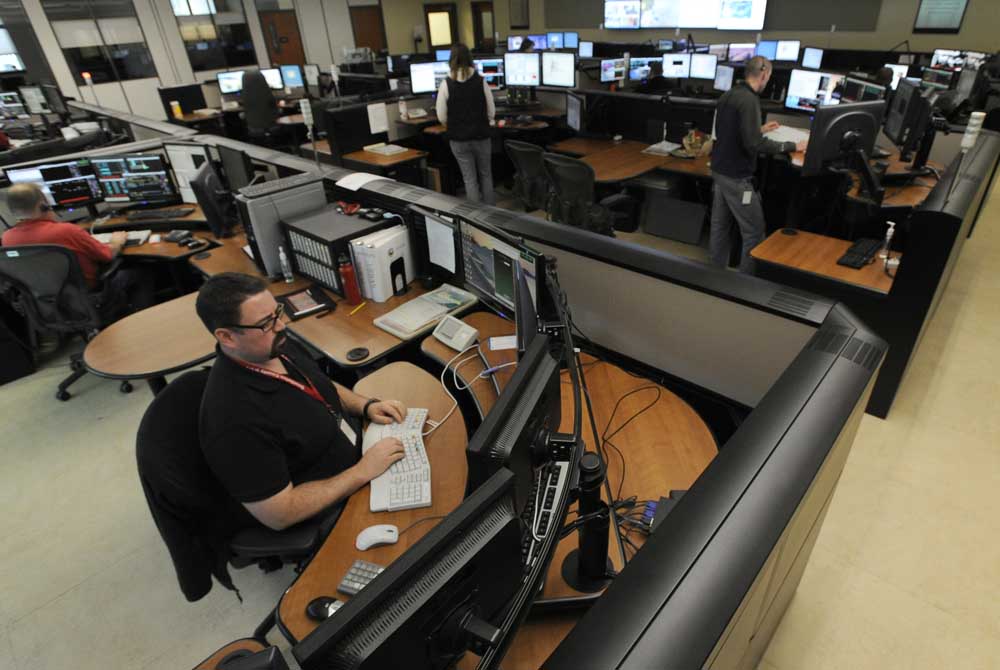Deschutes 911 staff shortages persist
Published 7:06 pm Monday, March 17, 2014

- Ryan Brennecke / The BulletinDispatcher Chad Hicks takes a call during a shift at the Deschutes County 911 dispatch center. County commissioners approved changes this week that are considered first steps toward a central 911 radio system for Central Oregon.
Most people take it for granted: When two cars collide on the highway, a house erupts in flames or a family member suffers a heart attack, 911 dispatchers are standing by to take the call.
But a 911 call in Deschutes County connects residents to an understaffed and overworked agency, stretched to the brink of its capabilities and without a true director to guide it.
Funding shortages have Deschutes County 911 employees working four 12-hour shifts a week, and supervisors who are supposed to monitor dispatchers are taking calls alongside them.
Internal audits have shown the 911 agency spends hundreds of thousands of dollars a year from its budget on overtime costs as a result.
A 2011 audit recommended the department add the equivalent of 9.5 full-time positions to ease dispatchers’ workloads and lower the overtime levels.
But just three new positions have been added since then, county budget figures show.
Dispatchers take anywhere from 160 to 200 calls a day, 911 Operations Manager Sara Crosswhite said Wednesday. That measures out to one call every four minutes over a 12-hour shift.
The workload has prompted an employee turnover rate between 60 and 72 percent in recent years.
Meanwhile, the number of 911 calls made in the county is rising with the overall population. Call volumes are up one-third since 2005.
More hiring
Some help could be on the way. Deschutes County Commissioners last week approved four new dispatcher positions for the 911 Department. But the positions haven’t been filled yet, and training will take six to eight months once hires are made.
Deschutes County Sheriff Larry Blanton, Bend Police Chief Jim Porter, Redmond Police Chief Dave Tarbet, Bend Fire Chief Larry Langston and other law enforcement leaders lobbied for the new positions during the meeting with commissioners last week. Each presented a laundry list of concerns.
Just one dispatcher coordinates fire and medical responses across the entire county. Adding a second is one of the department’s most pressing needs, Deputy County Administrator Erik Kropp said.
Langston said the change needs to come soon. A second fire and medical dispatcher is “something we’ve needed for 10-plus years.”
Porter said Bend police plan to add several officers to patrol teams over the next year. Extra police on the streets means more officers to coordinate with.
“It’s going to increase the number of calls” between 911 dispatchers and police responders, Porter said.
Leadership problems, funding shortages
Deschutes County 911’s troubles aren’t new. And they may start at the top.
Seventeen department directors have been hired and left over the last 20 years.
Senior managers Crosswhite and Rick Silbaugh, longtime 911 employees, have been running the department on an interim basis since Robert Poirier stepped down from the top post in June.
But they’re overseeing a staff of 43, and often sitting down to answer 911 calls themselves.
“Our supervisors are filling in too often,” Kropp said. “It’s extremely disruptive and not the best way to provide service.”
But the staffing shortages mean there’s usually no alternative when dispatchers take lunch breaks or call in sick, Silbaugh said.
The county is in the early stages of recruiting a new 911 director, but is more focused on filling vacancies such as the Health Services director, county officials have said.
Funding the department has been a challenge, too.
The county set up the 911 Service District in 1988, and several years later started collecting a tax of 16 cents per $1,000 on a homeowners’ property value to fund it.
But that rate doesn’t come close to covering the roughly $7.5 million in labor and operating costs needed to run Deschutes County 911 each year.
Voters approved a five-year, 23-cent levy to support the district in 2008, but the recession dented tax revenues and brought in less money than expected to the department.
The five-year levy was extended in May, but at a 20-cent rate instead of 23 cents.
Juggling responsibilities
In a fully staffed department, meanwhile, lower-level dispatchers — called telecom I positions — answer 911 calls. They pass the information to more senior dispatchers — called telecom II and telecom III — who provide details and directions to police, fire and medical officials.
But that’s rarely how it actually works in Deschutes County 911. The high-level dispatchers often juggle their responsibilities with basic call-taking.
“We’ve literally had people giving CPR instructions while coordinating emergency dispatchers,” Silbaugh said. “Someone giving CPR doesn’t want to be told to stand by, and responding units can’t stand by while you’re giving CPR instructions.”
Crosswhite said telecom II and III dispatchers “need to be focused on dispatching incidents out to police officers, fire units and (medical) responders,” not taking 911 calls.
They said the new employees should help, once they’re trained. But the county will still be several positions short of the staffing level recommended in the 2011 audit, Kropp noted during the meeting with law enforcement leaders.
Administrators want to move 911 dispatchers off a 12-hour shift eventually. But Kropp said they aren’t remotely close to being able to do that yet.
“There are additional staffing needs,” Kropp said. “We may come back” and ask for more staff when the county sets its 2014-15 budget this summer.
— Reporter: 541-617-7820, eglucklich@bendbulletin.com






